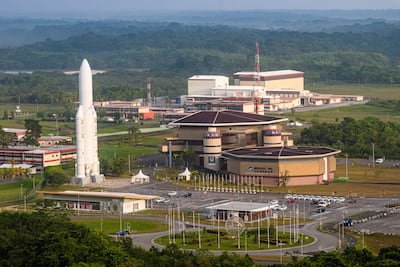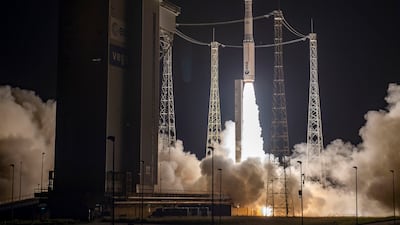A faulty part from Ukraine caused the failure of a European space mission in which two satellites were lost, investigators said on Friday.
The unmanned Vega C rocket took off from French Guiana in December but lost pressure after two minutes and 31 seconds and self destructed.
It was the third failure in eight attempted launches by Europe's Vega and Vega C rockets, sold by French company Arianespace.
With Russia no longer available as a launch partner, it leaves Europe struggling to ensure access to space.
"I would claim that we are in a crisis," Josef Aschbacher, the head of the European Space Agency, said on Friday.
"This is a moment where we need to reflect deeply [on] how to regain independent access to space for Europe."
The failure of December's mission caused the loss of two Earth observation satellites designed by Airbus.
The launcher lost pressure shortly after its second stage ignited and failed to accelerate as required.
Mission controllers instructed the launcher to self destruct and no damage was done on the ground, the ESA said.

Investigators traced the problem to the nozzle of a booster rocket that failed to withstand the extreme conditions.
The carbon nozzle was acquired in Ukraine by Italian contractor Avio.
Avio's chief executive Giulio Ranzo said the material had withstood tests and was selected several years ago, before the war in Ukraine.
"We had no reason to suspect [the] inadequacy of such material," he said.
Stephan Israel, the boss of Arianespace – a rival to Elon Musk's SpaceX – apologised to Airbus for the loss of the two satellites.
"For our customers, this failure is not acceptable," he said.
"This is the third failure in eight launches. However, we know that there is no launch with no risk."
The Vega-C launcher made a successful maiden flight last July but December's events meant failure on its first commercial mission.
The older Vega rocket failed when launching the UAE reconnaissance satellite Falcon Eye 1 in 2019 and a payload of Spanish and French satellites in 2020.

Despite these setbacks, the ESA hopes to carry out further Vega launches this year, Mr Aschbacher said.
The heavier Ariane 5 is scheduled to launch a mission to Jupiter's moons in April before it is retired and replaced by the long-delayed Ariane 6.
There was another European setback in January when a Virgin Orbit launch from Britain failed after an anomaly during the flight.
In the meantime, SpaceX has been hired to launch an ESA mission exploring dark matter in July and for German military satellites.
Russian Soyuz rockets carried more than two dozen European missions between 2011 and 2022, but ties were severed after the invasion of Ukraine.
Moscow has separately announced that it will quit the International Space Station after 2024 and plans to build its own space laboratory.


